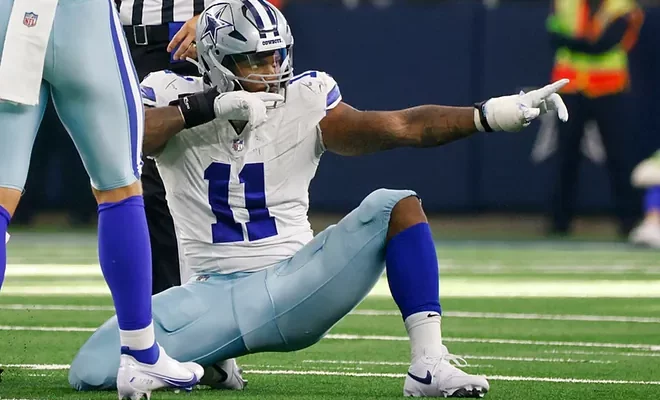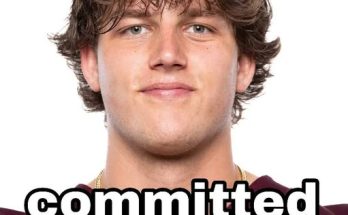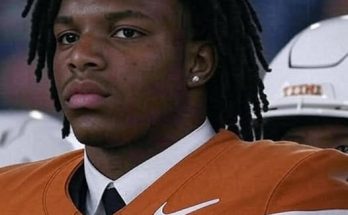The Dallas Cowboys have always thrived under the spotlight. With a legacy built on dynasties, drama, and star power, they are no strangers to headlines, expectations, or controversies. But even for America’s Team, few dilemmas in recent memory feel quite as precarious—or potentially explosive—as the one currently forming around their defensive superstar, Micah Parsons. On his nationally syndicated show, Colin Cowherd recently raised the alarm that the Cowboys may be “trapped,” staring down the barrel of a financial conundrum that could rattle their roster, shake up their long-term planning, and dramatically redefine their Super Bowl hopes.
Micah Parsons is not just another talented linebacker. He’s one of the most dominant and versatile defensive forces in the NFL. In just three seasons, he’s transformed from a high-ceiling draft pick to arguably the most valuable defensive player in the league. His stats, presence, and impact on the field are elite. He rushes the passer like a Pro Bowl edge rusher, covers like a safety, and commands double teams regularly. Teams build entire offensive game plans just to avoid him. That kind of influence is rare—and it’s why he’s in line to receive a contract extension that would make him the highest-paid defensive player in NFL history.
According to projections, Parsons could land a deal in the neighborhood of four years, \$184 million, with an average annual value (AAV) of \$46 million. That would eclipse even the historic extensions of Aaron Donald, Nick Bosa, and Myles Garrett. And while rewarding greatness is nothing new in the NFL, it’s the context around Dallas’ salary cap situation that has Cowherd—and a growing chorus of analysts—sounding the alarm.
The Cowboys already have a substantial amount of money tied up in key players. Dak Prescott, CeeDee Lamb, Trevon Diggs, and Zack Martin represent massive financial commitments, with Prescott himself holding the most team-friendly, yet leverage-laden deal in the NFL. With no guaranteed years remaining after 2024 and a \$59 million cap hit looming, Prescott’s future is already clouded with uncertainty. Any renegotiation of his contract—whether a restructure or a complete overhaul—will be expensive and complex. Add to that the pending mega-extension for Lamb, who’s emerging as one of the top wide receivers in football, and Dallas is facing a financial tightrope walk.
So where does Micah Parsons fit into that picture? That’s the trap Cowherd warns about. The Cowboys are in a position where not extending Parsons simply isn’t an option. Letting a generational defensive player walk is not only unthinkable but also catastrophic for the team’s competitive window. But paying him at market-setting value could severely limit their flexibility in keeping a championship-caliber roster intact. It’s a classic case of damned if you do, damned if you don’t.
Colin Cowherd’s critique dives deeper into organizational strategy. He argued that the Cowboys’ front office, led by Jerry and Stephen Jones, has delayed difficult decisions and now finds itself staring at a convergence of massive extensions all coming due at once. Instead of staggering deals and maintaining cap balance over several seasons, Dallas is now backed into a corner where multiple superstars need to get paid—or risk alienating the locker room and derailing momentum.
Parsons’ case is especially tricky because of how indispensable he is. On a defense coordinated by Dan Quinn for two years and now reimagined under Mike Zimmer, Parsons has been the chaos engine. He makes everyone around him better. Without him, the pressure on the secondary increases, the pass rush softens, and the overall unit becomes less dynamic. He’s not a plug-and-play linebacker; he’s the heartbeat of the defense.
Cowherd also pointed to the cultural dynamic in Dallas. The Cowboys are a franchise that leans into their stars. Their brand depends on them. Players like Parsons aren’t just football contributors—they’re media figures, marketing tools, and central characters in the team’s identity. There is no reality where the Cowboys can afford a prolonged contract standoff or, worse, an ugly breakup with their most marketable young player.
Yet the alarm is justified. Financial data and recent history show that when teams commit huge resources to a quarterback and a handful of stars, depth suffers. Injuries become more punishing. Roster construction grows fragile. Just look at the Los Angeles Rams post-Super Bowl or the Kansas City Chiefs before Patrick Mahomes’ restructure. Great teams with big contracts often enter a cycle of churn—one where draft picks must overperform and veterans are replaced with minimum-salary gambles.
The Cowboys are already trying to navigate that terrain. They’ve watched players like Dalton Schultz, Ezekiel Elliott, and La’el Collins depart due to cap constraints. They’ve been forced to get creative with veterans and plug holes with developmental talent. If they give Parsons what he deserves—and they will—they must also brace for what it costs elsewhere. That might mean letting go of more offensive line depth, skimping on linebacker support, or forgoing premium free-agent signings for the foreseeable future.
Another aspect Cowherd highlighted is timing. With the NFL’s salary cap projected to continue rising, there’s an argument that now is the best time to lock Parsons in before the market explodes further. Waiting too long, as they did with other stars, could make the eventual deal even more expensive. However, doing it now means making hard calls on players they’d probably prefer to keep—perhaps even dealing with uncomfortable tradeoffs like restructuring or parting ways with Dak Prescott in 2025 if his cap number becomes unmanageable.
There’s also a psychological component. The locker room knows who the alpha is. Parsons leads by example, brings energy to practice, and sets the tone on Sundays. If the Cowboys delay or lowball him, it risks alienating not only him but a roster full of players watching how the team treats their best. It’s a message about culture. It’s about whether loyalty, performance, and commitment are rewarded—or taken for granted.
The trap, then, is not just about numbers—it’s about philosophy. Do the Cowboys want to build around Parsons for the next five years and ride his prime to a title, even if it means restructuring the offense or turning over veterans? Or do they try to balance all three major contracts—Prescott, Lamb, Parsons—and gamble that they can thread the needle of elite talent without sinking into cap purgatory?
The problem with threading that needle is that the NFL rarely rewards caution. In a league that rewards boldness and punishes hesitation, Dallas must choose a path with conviction. Pay Parsons now and make him the face of the franchise, or wait and risk drama, distractions, and a possible rift with their best player. Cowherd’s comments reflect this very tension. The Cowboys are cornered, he argues, because they built a house on high-priced talent and now must decide which rooms to keep lit and which to leave dark.
There is no simple solution. Dallas can restructure Dak’s deal, front-load Lamb’s extension, and get creative with void years and bonuses. But every workaround comes at a cost. And the bill is coming due quickly. Parsons will be eligible for an extension this summer, and with every sack, tackle for loss, or game-changing play he makes, his price tag climbs higher.
Cowherd’s warning isn’t just about money—it’s about identity. Are the Cowboys a team that invests in defense the way they do offense? Are they willing to prioritize a linebacker over a quarterback if it comes down to it? These are foundational questions that shape the future of a franchise.
One thing is clear: Micah Parsons isn’t going anywhere quietly. He’s not just another player looking for a paycheck—he’s chasing greatness, a legacy, and a championship. And he knows his value. The Cowboys do too. But knowing it and affording it are two very different things. That’s the trap Colin Cowherd is talking about.
For now, the Cowboys still have control. But time is ticking, cap space is tightening, and Micah Parsons’ rise isn’t slowing down. Dallas faces a crossroads. Pay the man and recalibrate the roster around him—or gamble on the impossible: keeping all the stars in one galaxy without triggering an implosion.
Either way, the storm is coming. The question isn’t whether the Cowboys are trapped. It’s how they plan to escape.



